Difference between Organisational Learning and Learning Organisation
VerifiedAdded on 2023/06/18
|10
|2968
|84
AI Summary
This report analyzes the difference between organisational learning and learning organisation, their advantages, disadvantages, and examples. It also explains the elements involved in both concepts and their focus.
Contribute Materials
Your contribution can guide someone’s learning journey. Share your
documents today.
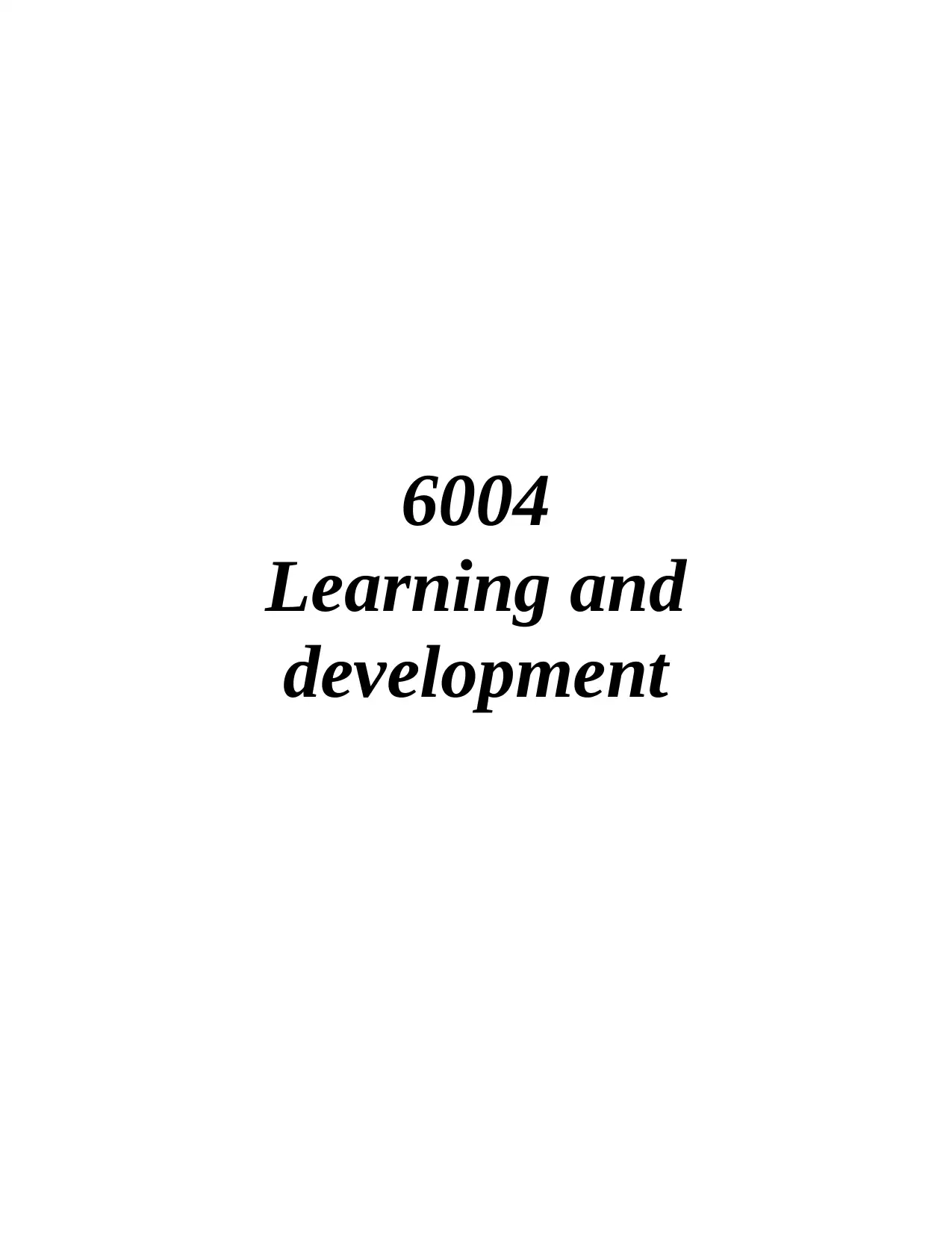
6004
Learning and
development
Learning and
development
Secure Best Marks with AI Grader
Need help grading? Try our AI Grader for instant feedback on your assignments.
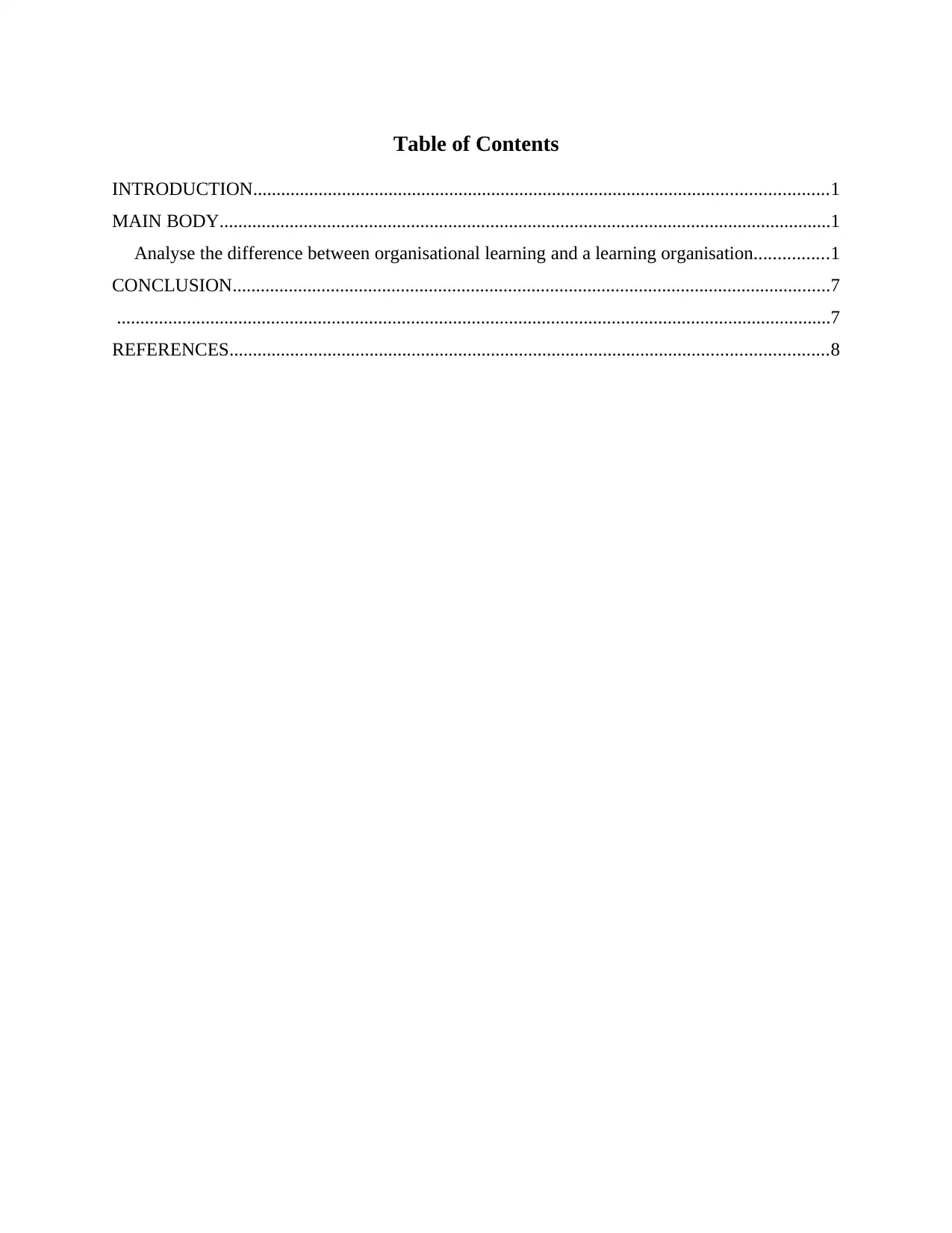
Table of Contents
INTRODUCTION...........................................................................................................................1
MAIN BODY...................................................................................................................................1
Analyse the difference between organisational learning and a learning organisation................1
CONCLUSION................................................................................................................................7
.........................................................................................................................................................7
REFERENCES................................................................................................................................8
INTRODUCTION...........................................................................................................................1
MAIN BODY...................................................................................................................................1
Analyse the difference between organisational learning and a learning organisation................1
CONCLUSION................................................................................................................................7
.........................................................................................................................................................7
REFERENCES................................................................................................................................8
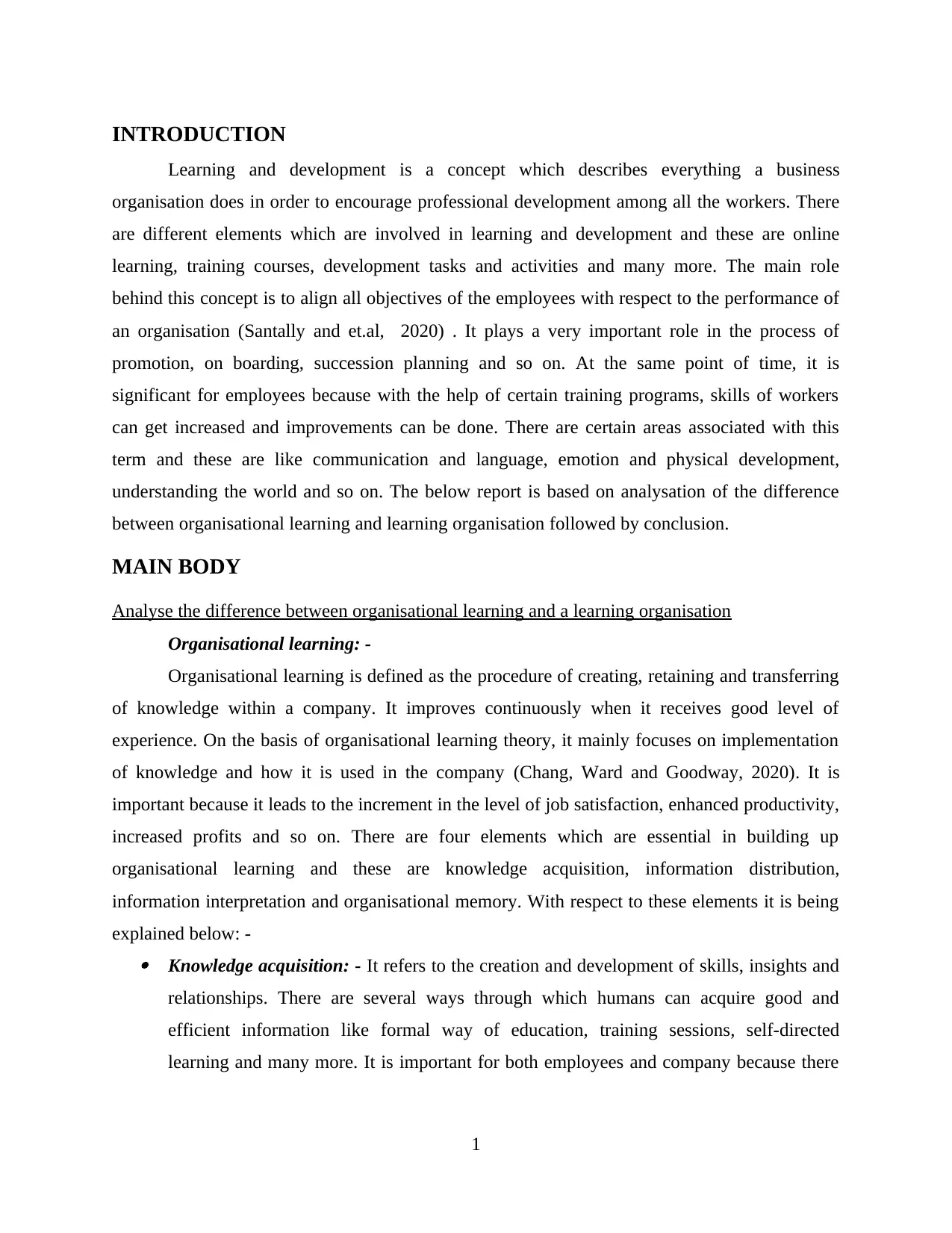
INTRODUCTION
Learning and development is a concept which describes everything a business
organisation does in order to encourage professional development among all the workers. There
are different elements which are involved in learning and development and these are online
learning, training courses, development tasks and activities and many more. The main role
behind this concept is to align all objectives of the employees with respect to the performance of
an organisation (Santally and et.al, 2020) . It plays a very important role in the process of
promotion, on boarding, succession planning and so on. At the same point of time, it is
significant for employees because with the help of certain training programs, skills of workers
can get increased and improvements can be done. There are certain areas associated with this
term and these are like communication and language, emotion and physical development,
understanding the world and so on. The below report is based on analysation of the difference
between organisational learning and learning organisation followed by conclusion.
MAIN BODY
Analyse the difference between organisational learning and a learning organisation
Organisational learning: -
Organisational learning is defined as the procedure of creating, retaining and transferring
of knowledge within a company. It improves continuously when it receives good level of
experience. On the basis of organisational learning theory, it mainly focuses on implementation
of knowledge and how it is used in the company (Chang, Ward and Goodway, 2020). It is
important because it leads to the increment in the level of job satisfaction, enhanced productivity,
increased profits and so on. There are four elements which are essential in building up
organisational learning and these are knowledge acquisition, information distribution,
information interpretation and organisational memory. With respect to these elements it is being
explained below: - Knowledge acquisition: - It refers to the creation and development of skills, insights and
relationships. There are several ways through which humans can acquire good and
efficient information like formal way of education, training sessions, self-directed
learning and many more. It is important for both employees and company because there
1
Learning and development is a concept which describes everything a business
organisation does in order to encourage professional development among all the workers. There
are different elements which are involved in learning and development and these are online
learning, training courses, development tasks and activities and many more. The main role
behind this concept is to align all objectives of the employees with respect to the performance of
an organisation (Santally and et.al, 2020) . It plays a very important role in the process of
promotion, on boarding, succession planning and so on. At the same point of time, it is
significant for employees because with the help of certain training programs, skills of workers
can get increased and improvements can be done. There are certain areas associated with this
term and these are like communication and language, emotion and physical development,
understanding the world and so on. The below report is based on analysation of the difference
between organisational learning and learning organisation followed by conclusion.
MAIN BODY
Analyse the difference between organisational learning and a learning organisation
Organisational learning: -
Organisational learning is defined as the procedure of creating, retaining and transferring
of knowledge within a company. It improves continuously when it receives good level of
experience. On the basis of organisational learning theory, it mainly focuses on implementation
of knowledge and how it is used in the company (Chang, Ward and Goodway, 2020). It is
important because it leads to the increment in the level of job satisfaction, enhanced productivity,
increased profits and so on. There are four elements which are essential in building up
organisational learning and these are knowledge acquisition, information distribution,
information interpretation and organisational memory. With respect to these elements it is being
explained below: - Knowledge acquisition: - It refers to the creation and development of skills, insights and
relationships. There are several ways through which humans can acquire good and
efficient information like formal way of education, training sessions, self-directed
learning and many more. It is important for both employees and company because there
1
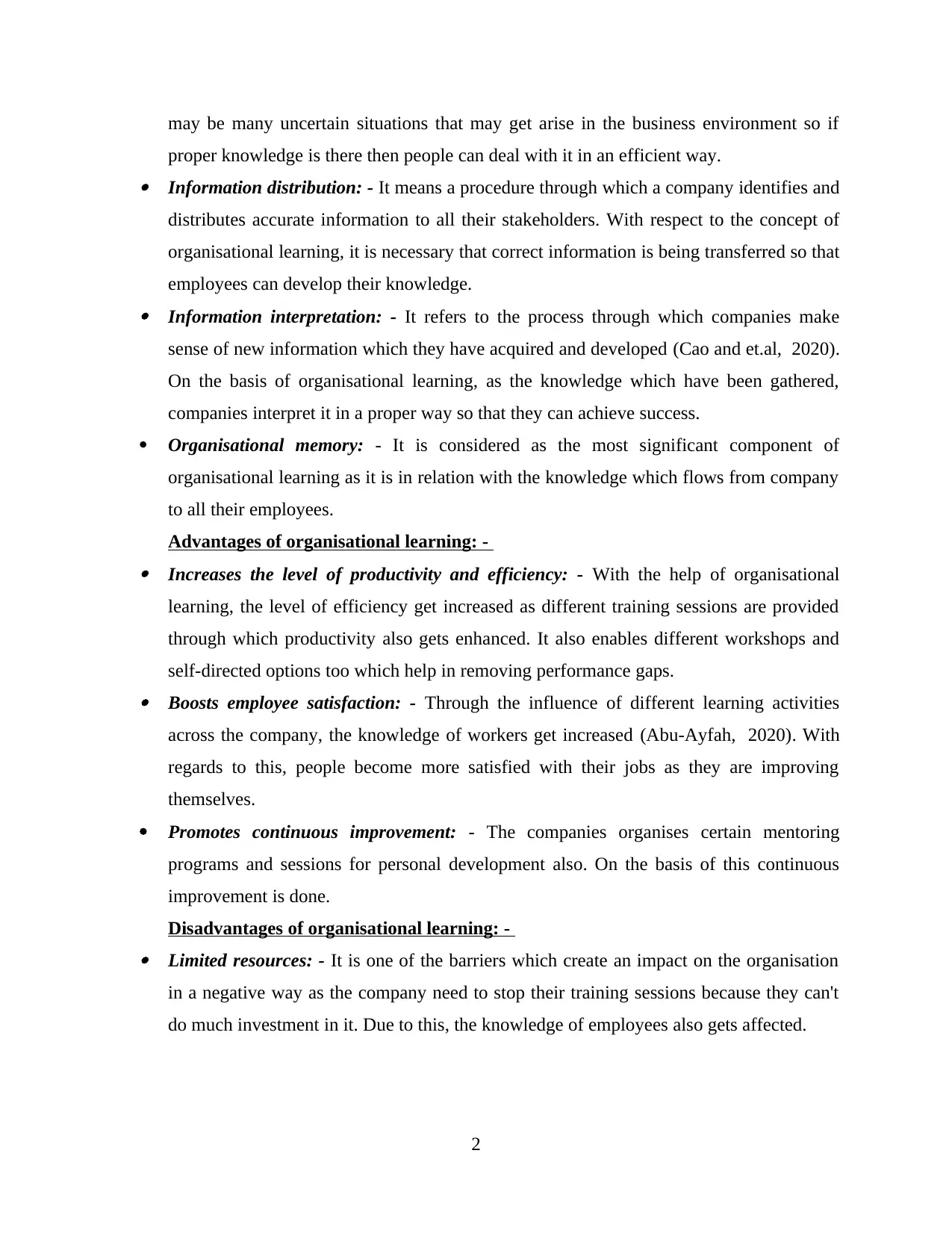
may be many uncertain situations that may get arise in the business environment so if
proper knowledge is there then people can deal with it in an efficient way. Information distribution: - It means a procedure through which a company identifies and
distributes accurate information to all their stakeholders. With respect to the concept of
organisational learning, it is necessary that correct information is being transferred so that
employees can develop their knowledge. Information interpretation: - It refers to the process through which companies make
sense of new information which they have acquired and developed (Cao and et.al, 2020).
On the basis of organisational learning, as the knowledge which have been gathered,
companies interpret it in a proper way so that they can achieve success.
Organisational memory: - It is considered as the most significant component of
organisational learning as it is in relation with the knowledge which flows from company
to all their employees.
Advantages of organisational learning: - Increases the level of productivity and efficiency: - With the help of organisational
learning, the level of efficiency get increased as different training sessions are provided
through which productivity also gets enhanced. It also enables different workshops and
self-directed options too which help in removing performance gaps. Boosts employee satisfaction: - Through the influence of different learning activities
across the company, the knowledge of workers get increased (Abu-Ayfah, 2020). With
regards to this, people become more satisfied with their jobs as they are improving
themselves.
Promotes continuous improvement: - The companies organises certain mentoring
programs and sessions for personal development also. On the basis of this continuous
improvement is done.
Disadvantages of organisational learning: - Limited resources: - It is one of the barriers which create an impact on the organisation
in a negative way as the company need to stop their training sessions because they can't
do much investment in it. Due to this, the knowledge of employees also gets affected.
2
proper knowledge is there then people can deal with it in an efficient way. Information distribution: - It means a procedure through which a company identifies and
distributes accurate information to all their stakeholders. With respect to the concept of
organisational learning, it is necessary that correct information is being transferred so that
employees can develop their knowledge. Information interpretation: - It refers to the process through which companies make
sense of new information which they have acquired and developed (Cao and et.al, 2020).
On the basis of organisational learning, as the knowledge which have been gathered,
companies interpret it in a proper way so that they can achieve success.
Organisational memory: - It is considered as the most significant component of
organisational learning as it is in relation with the knowledge which flows from company
to all their employees.
Advantages of organisational learning: - Increases the level of productivity and efficiency: - With the help of organisational
learning, the level of efficiency get increased as different training sessions are provided
through which productivity also gets enhanced. It also enables different workshops and
self-directed options too which help in removing performance gaps. Boosts employee satisfaction: - Through the influence of different learning activities
across the company, the knowledge of workers get increased (Abu-Ayfah, 2020). With
regards to this, people become more satisfied with their jobs as they are improving
themselves.
Promotes continuous improvement: - The companies organises certain mentoring
programs and sessions for personal development also. On the basis of this continuous
improvement is done.
Disadvantages of organisational learning: - Limited resources: - It is one of the barriers which create an impact on the organisation
in a negative way as the company need to stop their training sessions because they can't
do much investment in it. Due to this, the knowledge of employees also gets affected.
2
Secure Best Marks with AI Grader
Need help grading? Try our AI Grader for instant feedback on your assignments.
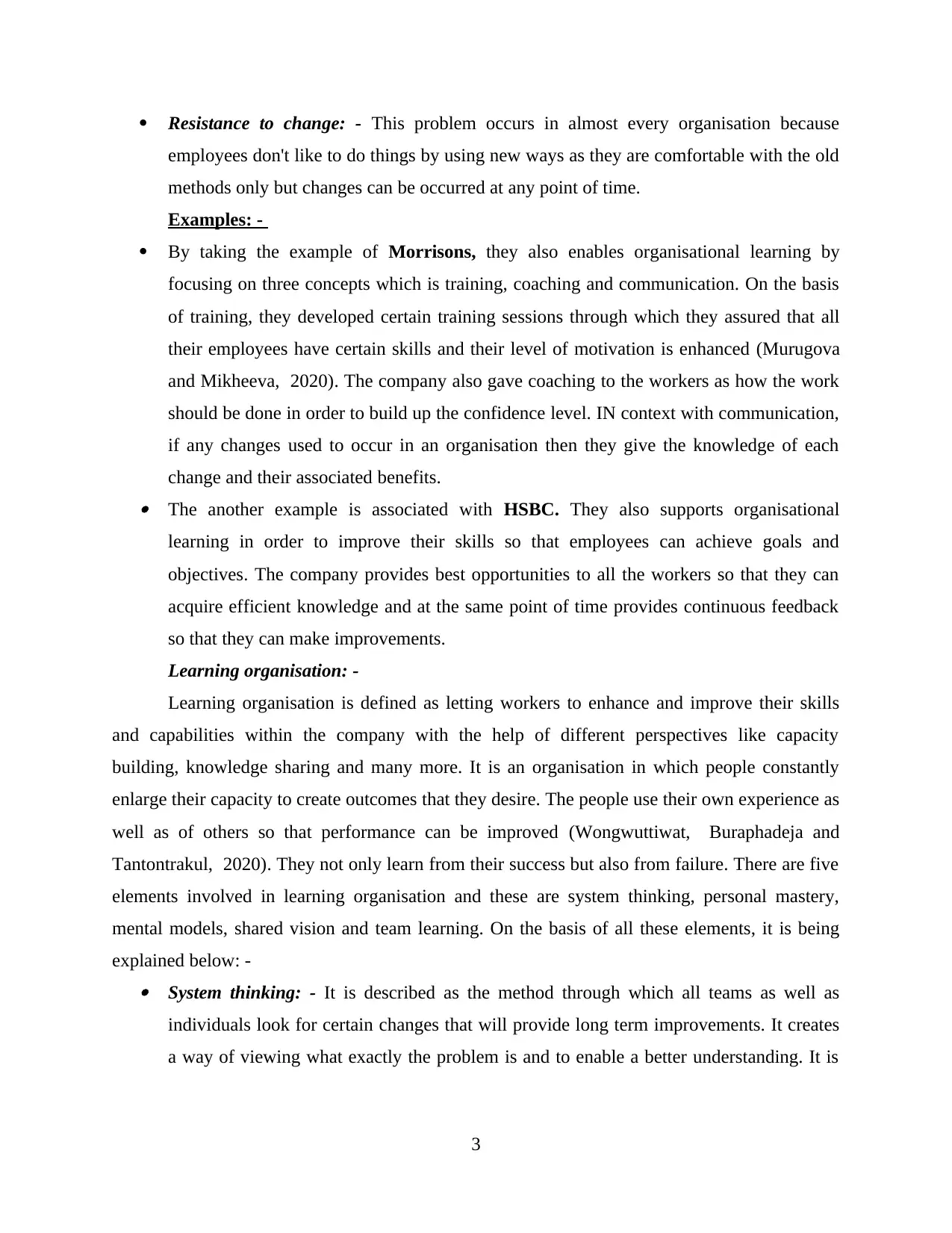
Resistance to change: - This problem occurs in almost every organisation because
employees don't like to do things by using new ways as they are comfortable with the old
methods only but changes can be occurred at any point of time.
Examples: -
By taking the example of Morrisons, they also enables organisational learning by
focusing on three concepts which is training, coaching and communication. On the basis
of training, they developed certain training sessions through which they assured that all
their employees have certain skills and their level of motivation is enhanced (Murugova
and Mikheeva, 2020). The company also gave coaching to the workers as how the work
should be done in order to build up the confidence level. IN context with communication,
if any changes used to occur in an organisation then they give the knowledge of each
change and their associated benefits. The another example is associated with HSBC. They also supports organisational
learning in order to improve their skills so that employees can achieve goals and
objectives. The company provides best opportunities to all the workers so that they can
acquire efficient knowledge and at the same point of time provides continuous feedback
so that they can make improvements.
Learning organisation: -
Learning organisation is defined as letting workers to enhance and improve their skills
and capabilities within the company with the help of different perspectives like capacity
building, knowledge sharing and many more. It is an organisation in which people constantly
enlarge their capacity to create outcomes that they desire. The people use their own experience as
well as of others so that performance can be improved (Wongwuttiwat, Buraphadeja and
Tantontrakul, 2020). They not only learn from their success but also from failure. There are five
elements involved in learning organisation and these are system thinking, personal mastery,
mental models, shared vision and team learning. On the basis of all these elements, it is being
explained below: - System thinking: - It is described as the method through which all teams as well as
individuals look for certain changes that will provide long term improvements. It creates
a way of viewing what exactly the problem is and to enable a better understanding. It is
3
employees don't like to do things by using new ways as they are comfortable with the old
methods only but changes can be occurred at any point of time.
Examples: -
By taking the example of Morrisons, they also enables organisational learning by
focusing on three concepts which is training, coaching and communication. On the basis
of training, they developed certain training sessions through which they assured that all
their employees have certain skills and their level of motivation is enhanced (Murugova
and Mikheeva, 2020). The company also gave coaching to the workers as how the work
should be done in order to build up the confidence level. IN context with communication,
if any changes used to occur in an organisation then they give the knowledge of each
change and their associated benefits. The another example is associated with HSBC. They also supports organisational
learning in order to improve their skills so that employees can achieve goals and
objectives. The company provides best opportunities to all the workers so that they can
acquire efficient knowledge and at the same point of time provides continuous feedback
so that they can make improvements.
Learning organisation: -
Learning organisation is defined as letting workers to enhance and improve their skills
and capabilities within the company with the help of different perspectives like capacity
building, knowledge sharing and many more. It is an organisation in which people constantly
enlarge their capacity to create outcomes that they desire. The people use their own experience as
well as of others so that performance can be improved (Wongwuttiwat, Buraphadeja and
Tantontrakul, 2020). They not only learn from their success but also from failure. There are five
elements involved in learning organisation and these are system thinking, personal mastery,
mental models, shared vision and team learning. On the basis of all these elements, it is being
explained below: - System thinking: - It is described as the method through which all teams as well as
individuals look for certain changes that will provide long term improvements. It creates
a way of viewing what exactly the problem is and to enable a better understanding. It is
3
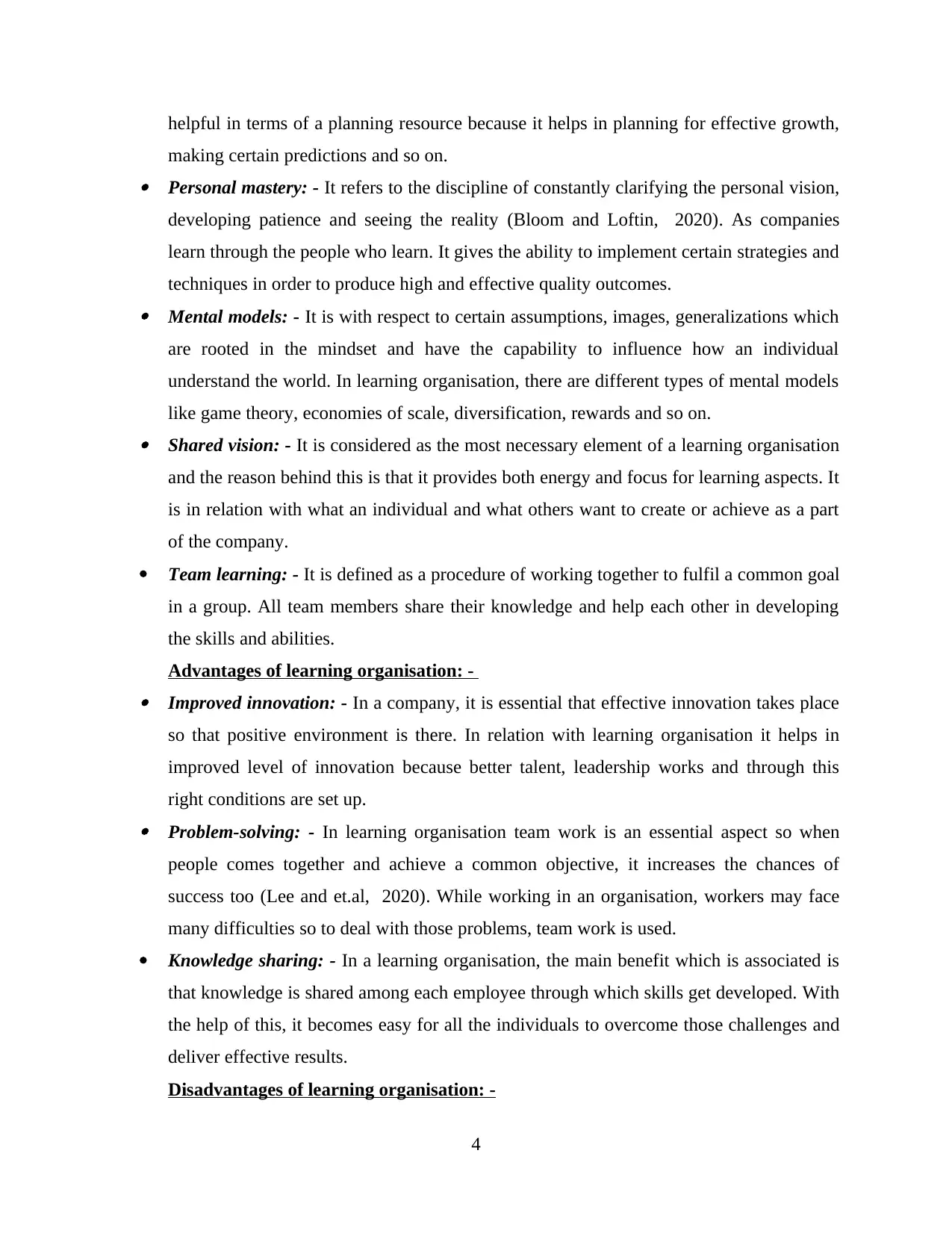
helpful in terms of a planning resource because it helps in planning for effective growth,
making certain predictions and so on. Personal mastery: - It refers to the discipline of constantly clarifying the personal vision,
developing patience and seeing the reality (Bloom and Loftin, 2020). As companies
learn through the people who learn. It gives the ability to implement certain strategies and
techniques in order to produce high and effective quality outcomes. Mental models: - It is with respect to certain assumptions, images, generalizations which
are rooted in the mindset and have the capability to influence how an individual
understand the world. In learning organisation, there are different types of mental models
like game theory, economies of scale, diversification, rewards and so on. Shared vision: - It is considered as the most necessary element of a learning organisation
and the reason behind this is that it provides both energy and focus for learning aspects. It
is in relation with what an individual and what others want to create or achieve as a part
of the company.
Team learning: - It is defined as a procedure of working together to fulfil a common goal
in a group. All team members share their knowledge and help each other in developing
the skills and abilities.
Advantages of learning organisation: - Improved innovation: - In a company, it is essential that effective innovation takes place
so that positive environment is there. In relation with learning organisation it helps in
improved level of innovation because better talent, leadership works and through this
right conditions are set up. Problem-solving: - In learning organisation team work is an essential aspect so when
people comes together and achieve a common objective, it increases the chances of
success too (Lee and et.al, 2020). While working in an organisation, workers may face
many difficulties so to deal with those problems, team work is used.
Knowledge sharing: - In a learning organisation, the main benefit which is associated is
that knowledge is shared among each employee through which skills get developed. With
the help of this, it becomes easy for all the individuals to overcome those challenges and
deliver effective results.
Disadvantages of learning organisation: -
4
making certain predictions and so on. Personal mastery: - It refers to the discipline of constantly clarifying the personal vision,
developing patience and seeing the reality (Bloom and Loftin, 2020). As companies
learn through the people who learn. It gives the ability to implement certain strategies and
techniques in order to produce high and effective quality outcomes. Mental models: - It is with respect to certain assumptions, images, generalizations which
are rooted in the mindset and have the capability to influence how an individual
understand the world. In learning organisation, there are different types of mental models
like game theory, economies of scale, diversification, rewards and so on. Shared vision: - It is considered as the most necessary element of a learning organisation
and the reason behind this is that it provides both energy and focus for learning aspects. It
is in relation with what an individual and what others want to create or achieve as a part
of the company.
Team learning: - It is defined as a procedure of working together to fulfil a common goal
in a group. All team members share their knowledge and help each other in developing
the skills and abilities.
Advantages of learning organisation: - Improved innovation: - In a company, it is essential that effective innovation takes place
so that positive environment is there. In relation with learning organisation it helps in
improved level of innovation because better talent, leadership works and through this
right conditions are set up. Problem-solving: - In learning organisation team work is an essential aspect so when
people comes together and achieve a common objective, it increases the chances of
success too (Lee and et.al, 2020). While working in an organisation, workers may face
many difficulties so to deal with those problems, team work is used.
Knowledge sharing: - In a learning organisation, the main benefit which is associated is
that knowledge is shared among each employee through which skills get developed. With
the help of this, it becomes easy for all the individuals to overcome those challenges and
deliver effective results.
Disadvantages of learning organisation: -
4
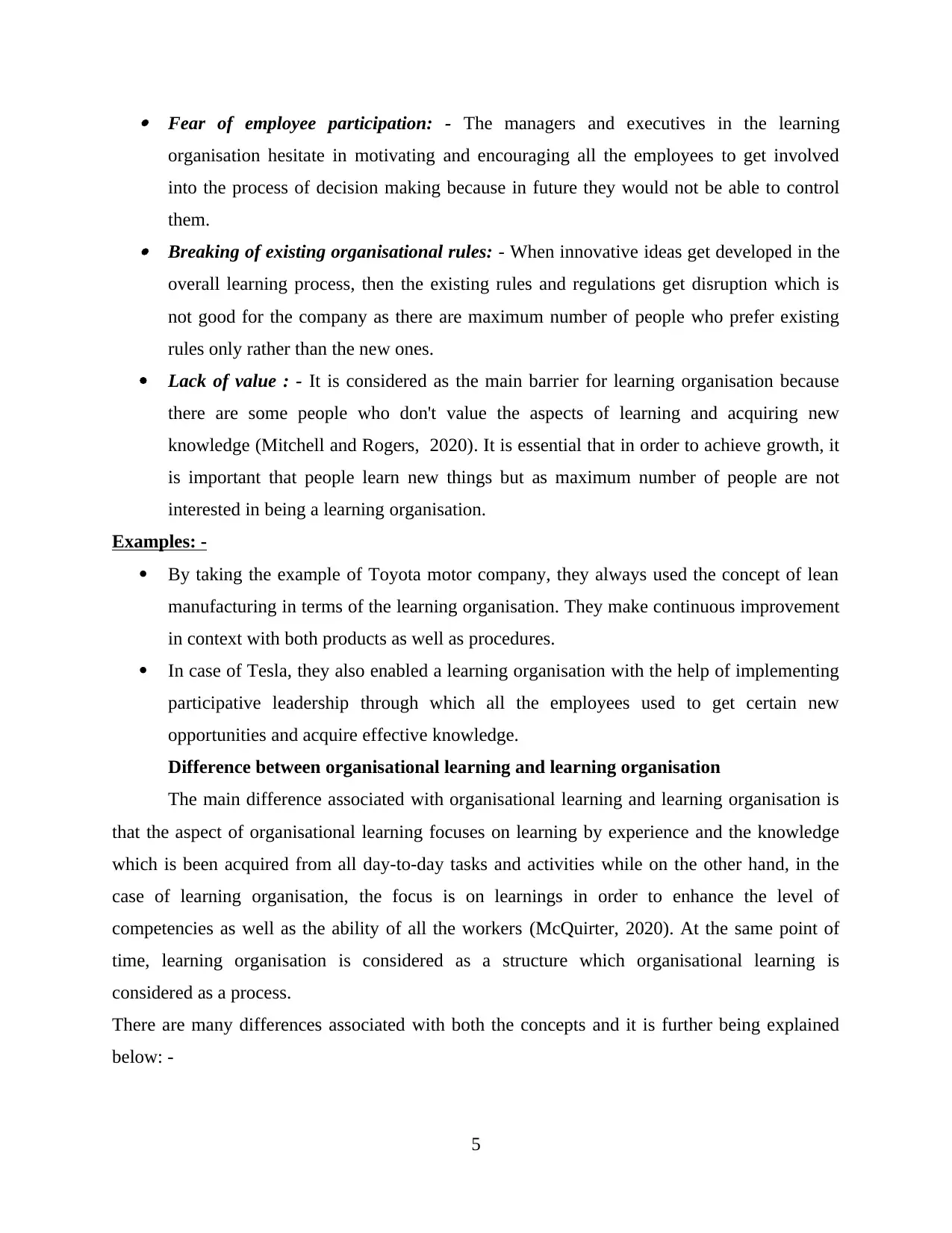
Fear of employee participation: - The managers and executives in the learning
organisation hesitate in motivating and encouraging all the employees to get involved
into the process of decision making because in future they would not be able to control
them. Breaking of existing organisational rules: - When innovative ideas get developed in the
overall learning process, then the existing rules and regulations get disruption which is
not good for the company as there are maximum number of people who prefer existing
rules only rather than the new ones.
Lack of value : - It is considered as the main barrier for learning organisation because
there are some people who don't value the aspects of learning and acquiring new
knowledge (Mitchell and Rogers, 2020). It is essential that in order to achieve growth, it
is important that people learn new things but as maximum number of people are not
interested in being a learning organisation.
Examples: -
By taking the example of Toyota motor company, they always used the concept of lean
manufacturing in terms of the learning organisation. They make continuous improvement
in context with both products as well as procedures.
In case of Tesla, they also enabled a learning organisation with the help of implementing
participative leadership through which all the employees used to get certain new
opportunities and acquire effective knowledge.
Difference between organisational learning and learning organisation
The main difference associated with organisational learning and learning organisation is
that the aspect of organisational learning focuses on learning by experience and the knowledge
which is been acquired from all day-to-day tasks and activities while on the other hand, in the
case of learning organisation, the focus is on learnings in order to enhance the level of
competencies as well as the ability of all the workers (McQuirter, 2020). At the same point of
time, learning organisation is considered as a structure which organisational learning is
considered as a process.
There are many differences associated with both the concepts and it is further being explained
below: -
5
organisation hesitate in motivating and encouraging all the employees to get involved
into the process of decision making because in future they would not be able to control
them. Breaking of existing organisational rules: - When innovative ideas get developed in the
overall learning process, then the existing rules and regulations get disruption which is
not good for the company as there are maximum number of people who prefer existing
rules only rather than the new ones.
Lack of value : - It is considered as the main barrier for learning organisation because
there are some people who don't value the aspects of learning and acquiring new
knowledge (Mitchell and Rogers, 2020). It is essential that in order to achieve growth, it
is important that people learn new things but as maximum number of people are not
interested in being a learning organisation.
Examples: -
By taking the example of Toyota motor company, they always used the concept of lean
manufacturing in terms of the learning organisation. They make continuous improvement
in context with both products as well as procedures.
In case of Tesla, they also enabled a learning organisation with the help of implementing
participative leadership through which all the employees used to get certain new
opportunities and acquire effective knowledge.
Difference between organisational learning and learning organisation
The main difference associated with organisational learning and learning organisation is
that the aspect of organisational learning focuses on learning by experience and the knowledge
which is been acquired from all day-to-day tasks and activities while on the other hand, in the
case of learning organisation, the focus is on learnings in order to enhance the level of
competencies as well as the ability of all the workers (McQuirter, 2020). At the same point of
time, learning organisation is considered as a structure which organisational learning is
considered as a process.
There are many differences associated with both the concepts and it is further being explained
below: -
5
Paraphrase This Document
Need a fresh take? Get an instant paraphrase of this document with our AI Paraphraser
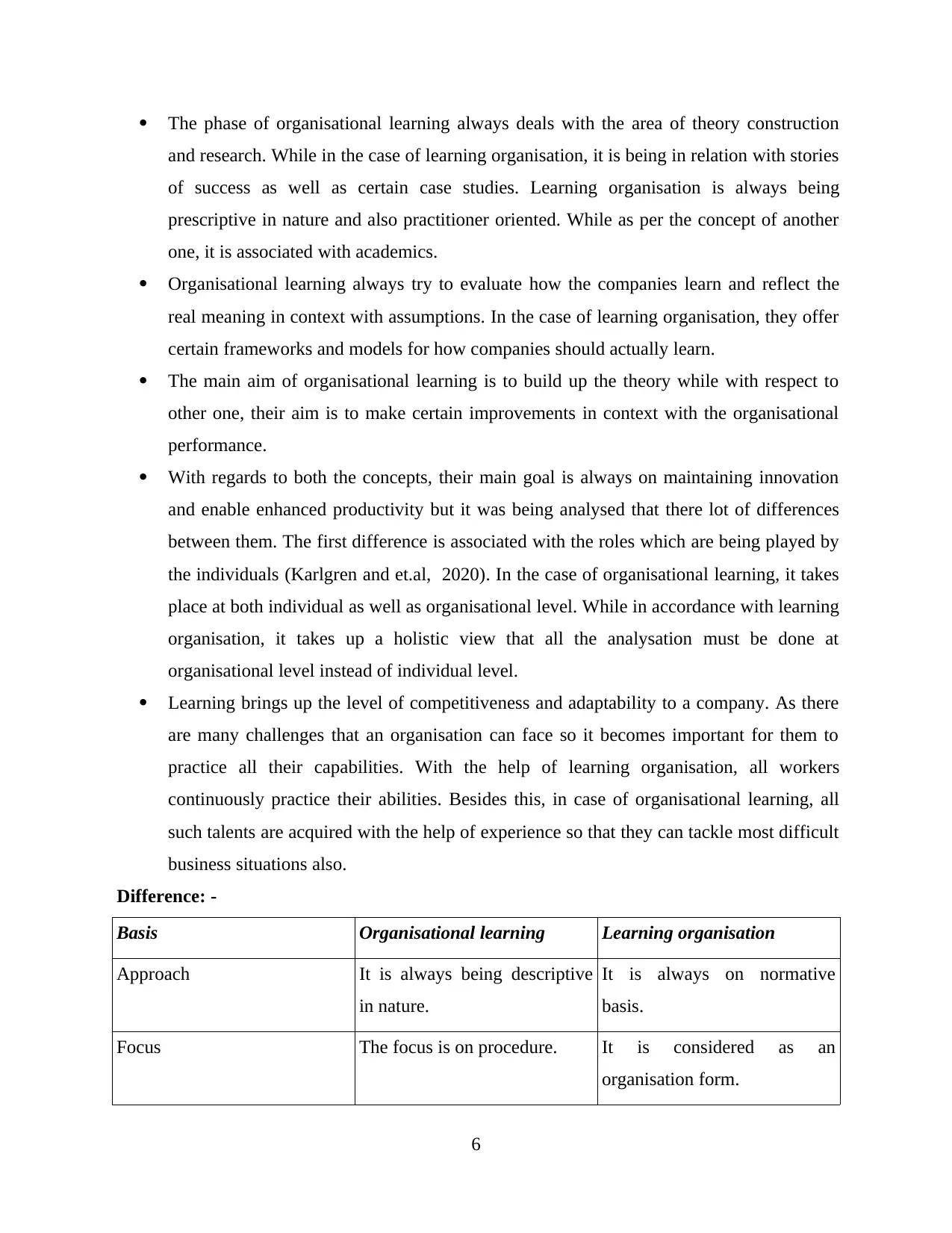
The phase of organisational learning always deals with the area of theory construction
and research. While in the case of learning organisation, it is being in relation with stories
of success as well as certain case studies. Learning organisation is always being
prescriptive in nature and also practitioner oriented. While as per the concept of another
one, it is associated with academics.
Organisational learning always try to evaluate how the companies learn and reflect the
real meaning in context with assumptions. In the case of learning organisation, they offer
certain frameworks and models for how companies should actually learn.
The main aim of organisational learning is to build up the theory while with respect to
other one, their aim is to make certain improvements in context with the organisational
performance.
With regards to both the concepts, their main goal is always on maintaining innovation
and enable enhanced productivity but it was being analysed that there lot of differences
between them. The first difference is associated with the roles which are being played by
the individuals (Karlgren and et.al, 2020). In the case of organisational learning, it takes
place at both individual as well as organisational level. While in accordance with learning
organisation, it takes up a holistic view that all the analysation must be done at
organisational level instead of individual level.
Learning brings up the level of competitiveness and adaptability to a company. As there
are many challenges that an organisation can face so it becomes important for them to
practice all their capabilities. With the help of learning organisation, all workers
continuously practice their abilities. Besides this, in case of organisational learning, all
such talents are acquired with the help of experience so that they can tackle most difficult
business situations also.
Difference: -
Basis Organisational learning Learning organisation
Approach It is always being descriptive
in nature.
It is always on normative
basis.
Focus The focus is on procedure. It is considered as an
organisation form.
6
and research. While in the case of learning organisation, it is being in relation with stories
of success as well as certain case studies. Learning organisation is always being
prescriptive in nature and also practitioner oriented. While as per the concept of another
one, it is associated with academics.
Organisational learning always try to evaluate how the companies learn and reflect the
real meaning in context with assumptions. In the case of learning organisation, they offer
certain frameworks and models for how companies should actually learn.
The main aim of organisational learning is to build up the theory while with respect to
other one, their aim is to make certain improvements in context with the organisational
performance.
With regards to both the concepts, their main goal is always on maintaining innovation
and enable enhanced productivity but it was being analysed that there lot of differences
between them. The first difference is associated with the roles which are being played by
the individuals (Karlgren and et.al, 2020). In the case of organisational learning, it takes
place at both individual as well as organisational level. While in accordance with learning
organisation, it takes up a holistic view that all the analysation must be done at
organisational level instead of individual level.
Learning brings up the level of competitiveness and adaptability to a company. As there
are many challenges that an organisation can face so it becomes important for them to
practice all their capabilities. With the help of learning organisation, all workers
continuously practice their abilities. Besides this, in case of organisational learning, all
such talents are acquired with the help of experience so that they can tackle most difficult
business situations also.
Difference: -
Basis Organisational learning Learning organisation
Approach It is always being descriptive
in nature.
It is always on normative
basis.
Focus The focus is on procedure. It is considered as an
organisation form.
6
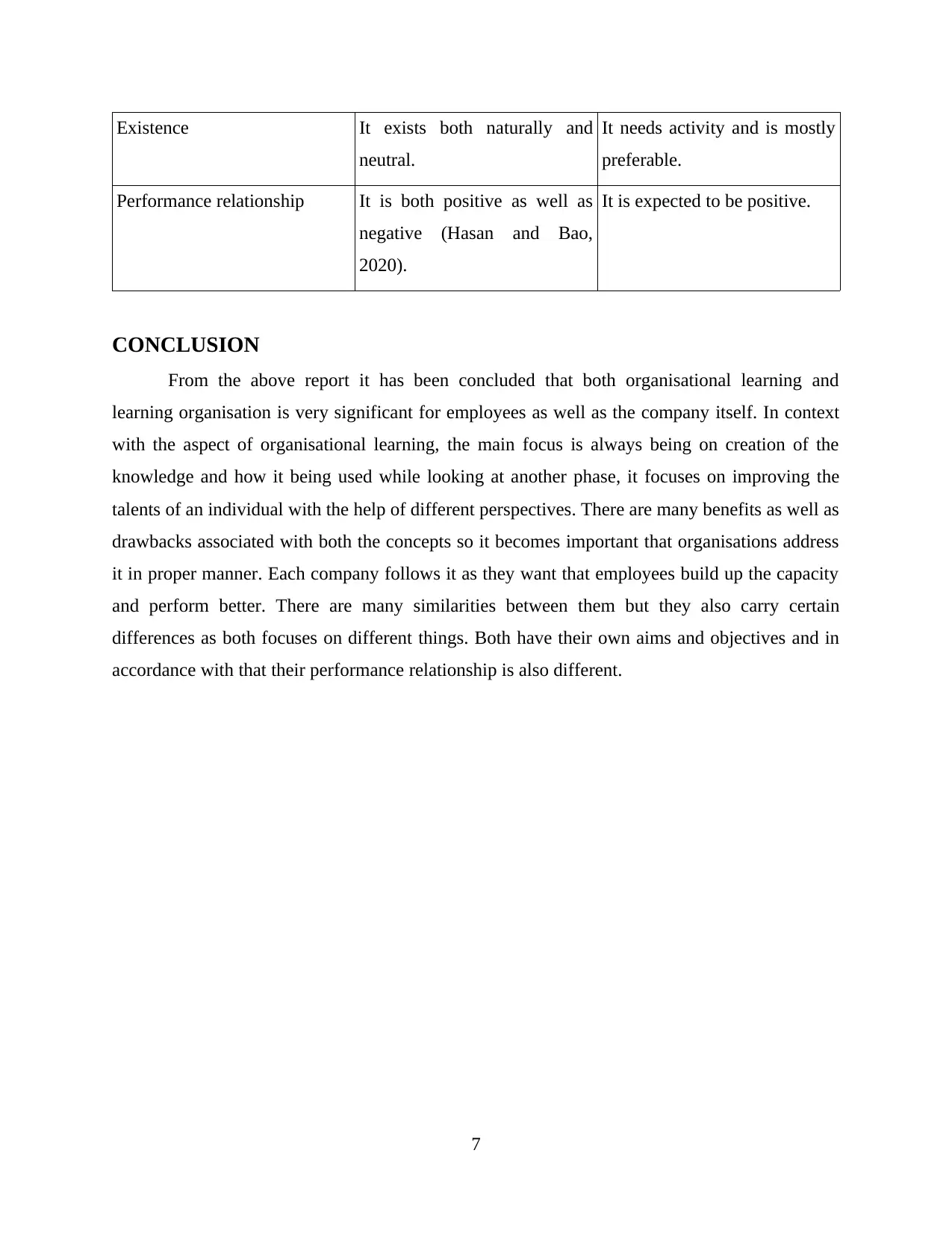
Existence It exists both naturally and
neutral.
It needs activity and is mostly
preferable.
Performance relationship It is both positive as well as
negative (Hasan and Bao,
2020).
It is expected to be positive.
CONCLUSION
From the above report it has been concluded that both organisational learning and
learning organisation is very significant for employees as well as the company itself. In context
with the aspect of organisational learning, the main focus is always being on creation of the
knowledge and how it being used while looking at another phase, it focuses on improving the
talents of an individual with the help of different perspectives. There are many benefits as well as
drawbacks associated with both the concepts so it becomes important that organisations address
it in proper manner. Each company follows it as they want that employees build up the capacity
and perform better. There are many similarities between them but they also carry certain
differences as both focuses on different things. Both have their own aims and objectives and in
accordance with that their performance relationship is also different.
7
neutral.
It needs activity and is mostly
preferable.
Performance relationship It is both positive as well as
negative (Hasan and Bao,
2020).
It is expected to be positive.
CONCLUSION
From the above report it has been concluded that both organisational learning and
learning organisation is very significant for employees as well as the company itself. In context
with the aspect of organisational learning, the main focus is always being on creation of the
knowledge and how it being used while looking at another phase, it focuses on improving the
talents of an individual with the help of different perspectives. There are many benefits as well as
drawbacks associated with both the concepts so it becomes important that organisations address
it in proper manner. Each company follows it as they want that employees build up the capacity
and perform better. There are many similarities between them but they also carry certain
differences as both focuses on different things. Both have their own aims and objectives and in
accordance with that their performance relationship is also different.
7
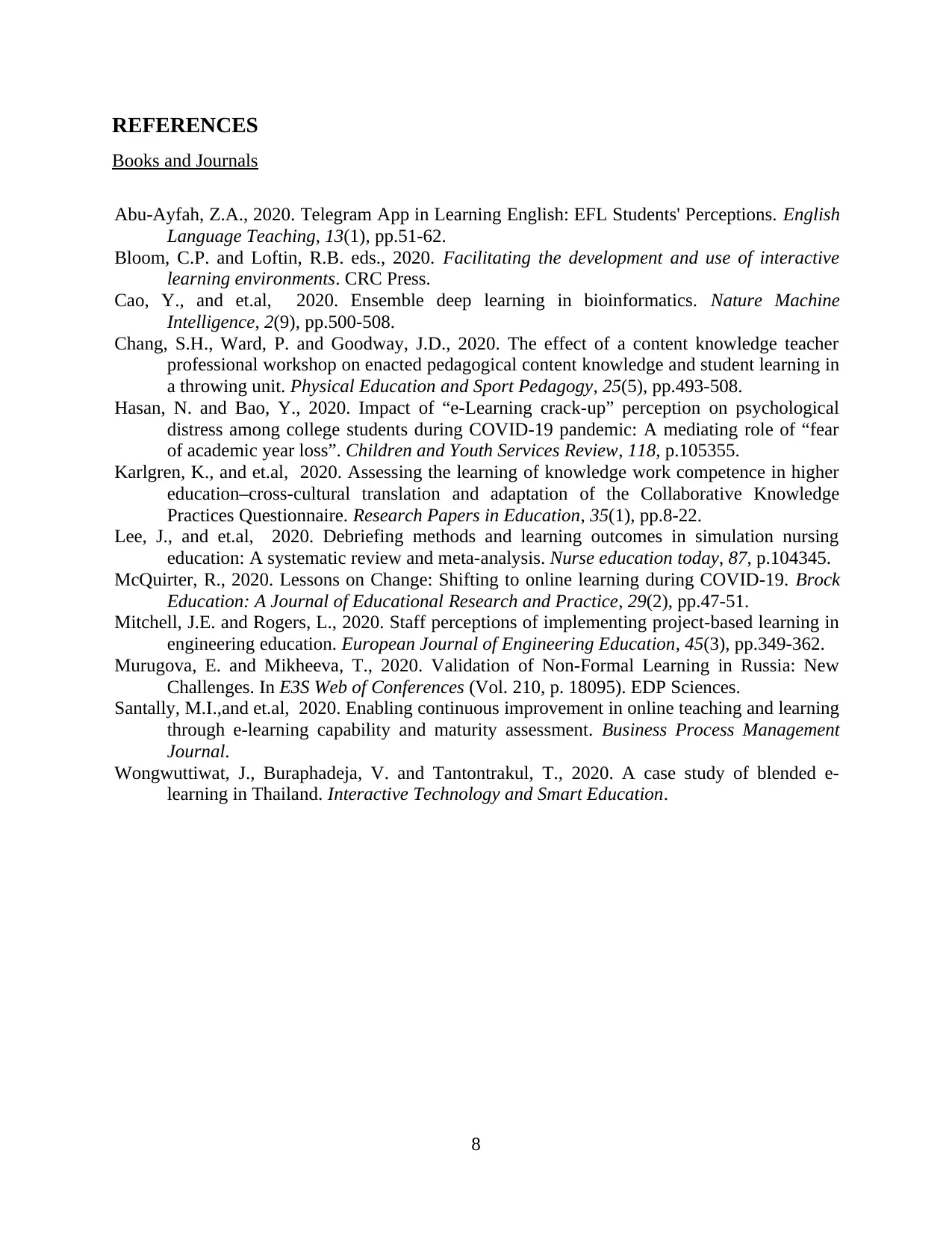
REFERENCES
Books and Journals
Abu-Ayfah, Z.A., 2020. Telegram App in Learning English: EFL Students' Perceptions. English
Language Teaching, 13(1), pp.51-62.
Bloom, C.P. and Loftin, R.B. eds., 2020. Facilitating the development and use of interactive
learning environments. CRC Press.
Cao, Y., and et.al, 2020. Ensemble deep learning in bioinformatics. Nature Machine
Intelligence, 2(9), pp.500-508.
Chang, S.H., Ward, P. and Goodway, J.D., 2020. The effect of a content knowledge teacher
professional workshop on enacted pedagogical content knowledge and student learning in
a throwing unit. Physical Education and Sport Pedagogy, 25(5), pp.493-508.
Hasan, N. and Bao, Y., 2020. Impact of “e-Learning crack-up” perception on psychological
distress among college students during COVID-19 pandemic: A mediating role of “fear
of academic year loss”. Children and Youth Services Review, 118, p.105355.
Karlgren, K., and et.al, 2020. Assessing the learning of knowledge work competence in higher
education–cross-cultural translation and adaptation of the Collaborative Knowledge
Practices Questionnaire. Research Papers in Education, 35(1), pp.8-22.
Lee, J., and et.al, 2020. Debriefing methods and learning outcomes in simulation nursing
education: A systematic review and meta-analysis. Nurse education today, 87, p.104345.
McQuirter, R., 2020. Lessons on Change: Shifting to online learning during COVID-19. Brock
Education: A Journal of Educational Research and Practice, 29(2), pp.47-51.
Mitchell, J.E. and Rogers, L., 2020. Staff perceptions of implementing project-based learning in
engineering education. European Journal of Engineering Education, 45(3), pp.349-362.
Murugova, E. and Mikheeva, T., 2020. Validation of Non-Formal Learning in Russia: New
Challenges. In E3S Web of Conferences (Vol. 210, p. 18095). EDP Sciences.
Santally, M.I.,and et.al, 2020. Enabling continuous improvement in online teaching and learning
through e-learning capability and maturity assessment. Business Process Management
Journal.
Wongwuttiwat, J., Buraphadeja, V. and Tantontrakul, T., 2020. A case study of blended e-
learning in Thailand. Interactive Technology and Smart Education.
8
Books and Journals
Abu-Ayfah, Z.A., 2020. Telegram App in Learning English: EFL Students' Perceptions. English
Language Teaching, 13(1), pp.51-62.
Bloom, C.P. and Loftin, R.B. eds., 2020. Facilitating the development and use of interactive
learning environments. CRC Press.
Cao, Y., and et.al, 2020. Ensemble deep learning in bioinformatics. Nature Machine
Intelligence, 2(9), pp.500-508.
Chang, S.H., Ward, P. and Goodway, J.D., 2020. The effect of a content knowledge teacher
professional workshop on enacted pedagogical content knowledge and student learning in
a throwing unit. Physical Education and Sport Pedagogy, 25(5), pp.493-508.
Hasan, N. and Bao, Y., 2020. Impact of “e-Learning crack-up” perception on psychological
distress among college students during COVID-19 pandemic: A mediating role of “fear
of academic year loss”. Children and Youth Services Review, 118, p.105355.
Karlgren, K., and et.al, 2020. Assessing the learning of knowledge work competence in higher
education–cross-cultural translation and adaptation of the Collaborative Knowledge
Practices Questionnaire. Research Papers in Education, 35(1), pp.8-22.
Lee, J., and et.al, 2020. Debriefing methods and learning outcomes in simulation nursing
education: A systematic review and meta-analysis. Nurse education today, 87, p.104345.
McQuirter, R., 2020. Lessons on Change: Shifting to online learning during COVID-19. Brock
Education: A Journal of Educational Research and Practice, 29(2), pp.47-51.
Mitchell, J.E. and Rogers, L., 2020. Staff perceptions of implementing project-based learning in
engineering education. European Journal of Engineering Education, 45(3), pp.349-362.
Murugova, E. and Mikheeva, T., 2020. Validation of Non-Formal Learning in Russia: New
Challenges. In E3S Web of Conferences (Vol. 210, p. 18095). EDP Sciences.
Santally, M.I.,and et.al, 2020. Enabling continuous improvement in online teaching and learning
through e-learning capability and maturity assessment. Business Process Management
Journal.
Wongwuttiwat, J., Buraphadeja, V. and Tantontrakul, T., 2020. A case study of blended e-
learning in Thailand. Interactive Technology and Smart Education.
8
1 out of 10
Related Documents
Your All-in-One AI-Powered Toolkit for Academic Success.
+13062052269
info@desklib.com
Available 24*7 on WhatsApp / Email
![[object Object]](/_next/static/media/star-bottom.7253800d.svg)
Unlock your academic potential
© 2024 | Zucol Services PVT LTD | All rights reserved.




